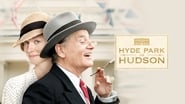Philip Hogan (Kurtz9791)
In some film portraits of famous people, it can be common for filmmakers to not directly focus on the prominent historical figure, but to have a side character (sometimes fictional) tell the story from their point of view. Sometimes this is done because the celebrity at the film's focus might be so larger than life that it is too difficult to tell their story their way. The side character becomes an extension of the audience, a way for them to get inside the world of the film and let them into the private lives of public people. Think about the 2006 film "The Last King of Scotland" about Idi Amin, only told through the perspective of his fictional Scottish doctor. But in the case of Roger Michell's "Hyde Park on Hudson", it might be because the filmmakers are not sure what story they really want to tell.We start the movie with narration from Daisy, a distant cousin of FDR who begins an implied affair with the leader of the free world in the spring of 1939 while the President stays at his mother's home in upstate New York, the title of the picture. Practically all of the film's problems stem from this character. There are some schools of thought that say narration in a film is the easy way out. I think it can be used quite creatively, but in "Hyde Park on Hudson", it feels too much like it's filling in the expository details that the script couldn't manage.While this relationship might have some historical fact to it, it really doesn't warrant a feature length film. What's worse is that they got a great actress in the form of Laura Linney to play such a thankless and empty role. And it's the main character! There are some humanizing touches that reveal how she is caught in between two worlds, but the filmmakers would have been wiser to focus on another aspect to tell the story.The film never feels like it starts until the King and Queen of England are introduced. They come to visit the President at his home away from the White House to confirm that they are in fact allies right before Europe goes up in flames. Played by Samuel West and Olivia Colman respectively, they add some of the films funniest moments as well as dramatic. History buffs will be disappointed after a little research to learn that this film and what it depicts are mostly a work of fiction, a historical chamber piece that takes great liberties for the sake of entertainment. However, the most enjoyable moments come from watching the King and Queen's fish out of water take on their American hosts.I haven't even mentioned Bill Murray's performance as President Roosevelt, the film's saving grace and perhaps the best thing about it. Because of the confused script, Murray only has about one scene of meaty dialogue and a chance to showcase his acting. It is a late night drink between the two world leaders where they exchange vulnerabilities that is the heart of the film. Murray's witty sensibilities as an actor work well with the laid back depiction of FDR. Whether he is arguing with the women in his life or mentally messing with his Royal guests, he is brilliant.So what we end up with is a missed opportunity. We have a film that doesn't really know what it wants to say, and thus ends up feeling like two different movies, one very good and the other meandering. Still, the whole thing is a harmless (and short) affair, and worth seeing if you are a fan of Bill Murray.
Bearauburn
If you like dreamy movies with atmosphere, this film is a sheer delight. The President emerges as a warm, immensely human persona, who urges his aids to spy on his somewhat controlling and volatile mother. The royal visit, though probably historically inaccurate, is displayed with tongue in cheek humor and excellent performances.Laura Linney is understated and poignant, with a hint of bittersweet.I was also surprised to find a Cherokee Dance at the royal picnic--who could ask for more in a movie?The British filming location adds a wistful and lovely atmosphere, intensifying the romantic and complex frolic of events.
billsoccer
Good - All in all, a good story about a minor historical event. Bill Murray did great job in a non-comedic role. The storyline was interesting: one of FDR's mistresses gets drawn into a pre WW II visit by British monarchs. The story is told without the usual attention to the depression, still going on at the time of the story. My view of FDR was undermined by the immorality displayed by FDR. I would have put that in the 'bad' category, but for the fact that the movie caused these emotions, meaning it did a good job. Remember how you felt about Denzel after Training Day? Bad - The films end states that FDR finally kept his promise to help after WWII started. Lend-Lease and precursor programs to help arm the future allies actually could likely be tied to this visit - it would be nice for the author to have done more homework here.
kosmasp
It's almost a bit like a history lesson. While "The Kings Speech" did get nominated for Oscars and was a huge success, not the same can be said about this movie. Although it does have two of the same main "characters" in it. Played a different set of actors of course. And then you also have Bill Murray. The ever reliable and very funny man, who's playing a charismatic, while disabled President.It does check many boxes and it is pretty to look at. But it doesn't feel like something that will appeal to a huge crowd of people. The "story" is very limited and while the end/event is something that might get a little excitement out of you, the rest of the movie seems to lack that passion.







